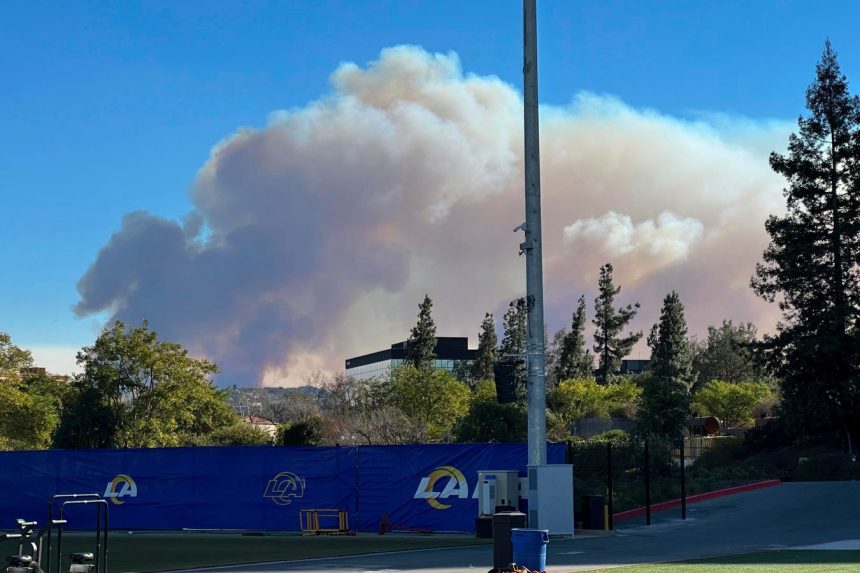The Los Angeles Rams, facing the Minnesota Vikings in an NFC playoff matchup, found themselves in an unprecedented situation: playing a “home” game hundreds of miles away from their actual home stadium. The devastating wildfires that ravaged the Los Angeles area, causing widespread destruction and displacement, forced the NFL to relocate the game from SoFi Stadium in Inglewood, California, to State Farm Stadium in Glendale, Arizona. While SoFi Stadium remained untouched by the flames, the logistical challenges posed by the ongoing disaster, including the strain on emergency resources and the hazardous air quality caused by the dense smoke, made it impossible to host the game in Los Angeles. This displacement marked a heartbreaking turn of events for the Rams, who had earned the right to host a playoff game after a challenging season, and for their fans, who were deprived of the opportunity to cheer on their team in person.
The Rams’ departure from Los Angeles was a swift and necessary response to the rapidly evolving crisis. The team’s practices were severely hampered by the thick smoke blanketing the region, prompting the Arizona Cardinals to extend a helping hand to their NFC West rivals. The Cardinals generously offered the use of their practice facilities and even provided their owner’s plane to facilitate the Rams’ relocation to Arizona. The move underscored the solidarity and compassion within the NFL community in the face of such adversity. For many Rams players and staff, the wildfires were not just a distant news story but a personal tragedy. Approximately 30 members of the team, including head coach Sean McVay, were forced to evacuate their homes due to the encroaching fires. This personal connection to the disaster further emphasized the gravity of the situation and the appropriateness of relocating the game.
The decision to move the game was met with widespread understanding and support. Rams President Kevin Demoff acknowledged the disappointment for the fans and players while emphasizing the paramount importance of prioritizing safety and community well-being in the midst of the crisis. The Rams organization, along with the NFL, recognized that holding the game in Los Angeles would have placed an undue burden on already strained emergency services and could have potentially jeopardized the safety of players, staff, and fans. The relocation to Arizona, while logistically complex, was deemed the only responsible course of action.
Despite the unfamiliar surroundings, the Rams organization made every effort to recreate a sense of home-field advantage at State Farm Stadium. The end zones were repainted to match those at SoFi Stadium, and other efforts were made to imbue the venue with a Rams-centric atmosphere. However, the underlying reality of the wildfires remained a heavy presence for the team. The unpredictable nature of the fires and the ongoing threat to their homes and community weighed heavily on the minds of many within the Rams organization. The optics of the game were secondary to the genuine concern for the well-being of their loved ones and the broader Los Angeles community.
The scale of the disaster was staggering. The wildfires consumed over 40,000 acres, obliterating more than 10,000 homes and businesses. The human cost was also tragically high, with at least ten fatalities attributed to the fires by the time of the game. These grim statistics served as a stark reminder of the immense challenges facing the Los Angeles area and the importance of focusing on recovery and rebuilding efforts. The Rams, despite facing the pressure of a playoff game, understood the significance of their role in supporting their community during this difficult time.
Facing the Minnesota Vikings, the Rams were forced to concede their true home-field advantage. However, the team’s focus remained on the larger context of the disaster and the need to support their community. The Rams chose to wear T-shirts and caps emblazoned with “LAFD” during the game as a tribute to the Los Angeles Fire Department and their tireless efforts to combat the wildfires. This gesture of solidarity demonstrated the team’s commitment to their city and their recognition of the heroism of the first responders. The Rams’ journey to the playoffs had already been marked by resilience, overcoming a challenging 1-4 start and numerous injuries. The wildfires and the subsequent relocation of the game added another layer of adversity to their season, testing their resolve once more. Regardless of the outcome of the game, the Rams aimed to represent their city with pride and determination, demonstrating the spirit of resilience in the face of unprecedented challenges.



